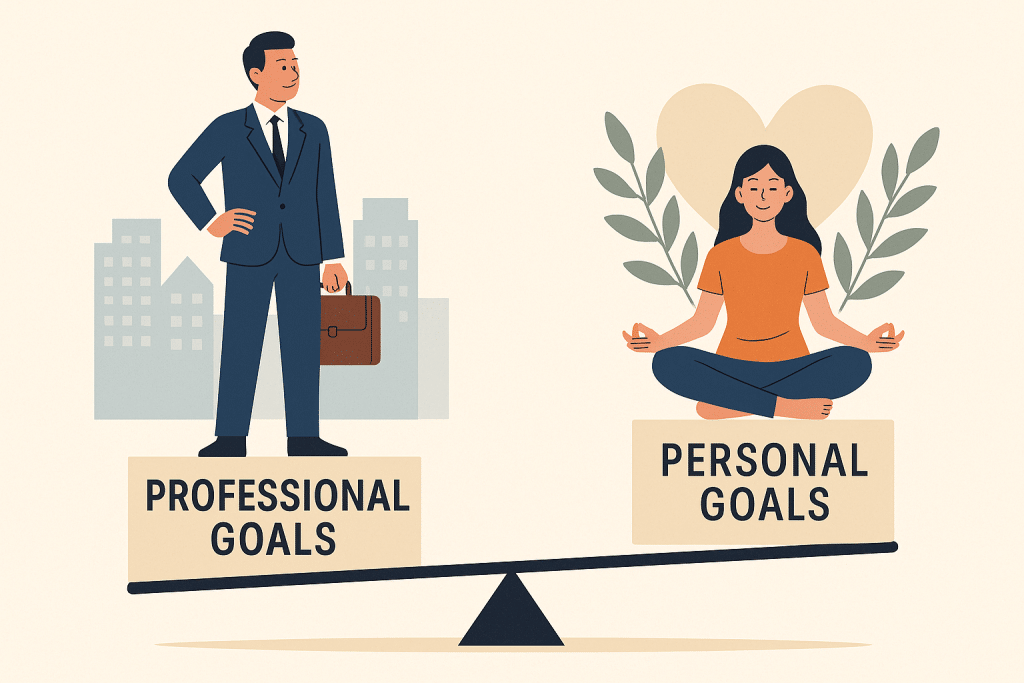Finding the Right Balance Between Professional and Personal Goals
Ella Knight August 4, 2025
In a world where hustle culture often reigns, it’s easy to get caught up in the race for professional success. At the same time, personal life goals, such as health, relationships, and personal growth, can sometimes feel like an afterthought. As the demands of work escalate, achieving the right balance between professional and personal goals has become a critical pursuit for individuals seeking both fulfillment and success.
This article explores how to find that balance in the modern world, emphasizing strategies and emerging trends to harmonize personal aspirations with career objectives. Whether you’re a seasoned professional or just starting your career, understanding how to prioritize, delegate, and effectively manage your time is essential for long-term well-being and success.

The Importance of Balancing Professional and Personal Goals
In today’s fast-paced world, achieving balance between your professional and personal life is no longer just a luxury but a necessity. Overworking and neglecting personal goals can lead to burnout, stress, and even a decrease in productivity. On the other hand, ignoring career goals to focus only on personal aspirations may result in missed opportunities and a stagnant professional life.
Why Balance is Critical for Mental Health and Success
Studies consistently show that balancing work with personal pursuits leads to higher levels of job satisfaction and personal happiness. According to a 2023 Gallup report, employees with a strong work-life balance report a 20% increase in productivity, compared to those who are overburdened with work. Furthermore, maintaining a balance helps individuals avoid the stress and fatigue that often accompanies the ‘always-on’ work mentality, contributing to better mental health, physical well-being, and job engagement.
However, achieving this balance is not always easy. With work increasingly invading personal time, particularly due to remote working arrangements and the rise of digital communication tools, it requires deliberate action to set boundaries and prioritize effectively.
Emerging Trends Shaping the Balance Between Work and Personal Life
As the boundaries between personal and professional lives blur, new trends are emerging that help people achieve a better equilibrium between the two spheres. Let’s take a closer look at some of the key trends shaping this conversation today.
1. Remote Work and Flexible Schedules
The COVID-19 pandemic accelerated the shift to remote work, which has had lasting impacts on work-life balance. Many businesses are now offering flexible work schedules, allowing employees to have more control over their daily routines. The ability to work from home has made it easier for people to juggle work responsibilities with personal goals, such as spending more time with family or exercising during the day.
A 2023 study from Stanford University found that employees working from home reported higher productivity levels and better work-life balance compared to their office-bound counterparts. However, it’s important to note that the flexibility provided by remote work also requires self-discipline and clear boundaries to prevent work from encroaching on personal time.
2. Mental Health Support in the Workplace
The stigma surrounding mental health in the workplace has been slowly decreasing in recent years. Many companies are now offering resources like mental health days, counseling services, and stress management programs. This trend not only shows an increasing awareness of the importance of well-being but also reflects how businesses recognize the connection between a balanced, healthy workforce and increased productivity.
In 2023, Deloitte’s Global Human Capital Trends Report highlighted that 80% of companies worldwide are focusing on employee well-being as a key priority. Providing employees with mental health support and ensuring they have the time to focus on personal well-being has been shown to enhance both their professional performance and personal satisfaction.
3. The Rise of “Personal Branding” and Career Flexibility
In recent years, the concept of “personal branding” has gained traction. Professionals are increasingly seeking to align their careers with their personal values and goals. This trend is empowering individuals to take more control over their careers by pursuing flexible work opportunities, freelance roles, or entrepreneurship that can accommodate personal growth goals.
Social media platforms like LinkedIn, Instagram, and Twitter now allow professionals to build and maintain their personal brands, making it easier to find work that resonates with their life goals. This shift has contributed to a more flexible, personalized approach to career development that fosters a healthier work-life balance.
Actionable Tips for Finding the Right Balance
Now that we understand why balance is essential and the trends that are shaping it, let’s dive into some actionable tips that can help you create a better balance between your professional and personal life.
1. Prioritize Your Time and Set Clear Boundaries
One of the first steps to balancing professional and personal goals is learning how to prioritize your time. Start by setting clear boundaries between work and personal activities. This could mean establishing specific work hours, avoiding checking work emails after hours, or ensuring that weekends are reserved for personal time.
Effective time management can also involve using tools such as:
- Time blocking: Dedicate specific blocks of time to work and personal tasks.
- Task prioritization: Use tools like the Eisenhower Matrix to prioritize tasks based on urgency and importance.
- Digital detox: Schedule regular breaks from digital devices, especially during evenings or weekends, to focus on non-work activities.
By making time for both your personal and professional lives, you ensure that neither one dominates your entire existence.
2. Delegate and Share Responsibilities
Another crucial component of balancing work and wellness is recognizing that you don’t have to do everything yourself. Delegating tasks, both at work and at home, can give you the space to focus on your personal goals. At work, this might involve delegating tasks to colleagues, while at home, it might mean sharing household chores with your partner or family members.
Additionally, if you’re in a leadership position, consider fostering a culture of collaboration and mutual support within your team. A 2023 study by Harvard Business Review found that teams with high levels of collaboration report better work-life balance, higher productivity, and increased job satisfaction.
3. Invest in Your Physical and Mental Health
Taking care of your physical and mental health should be a priority if you want to perform well in both personal and professional spheres. Exercise, proper nutrition, and sufficient sleep are foundational elements that contribute to overall well-being.
Here are a few strategies for incorporating health into your routine:
- Exercise regularly: Aim for at least 30 minutes of moderate physical activity every day. This will not only improve your physical health but will boost your mood and energy levels.
- Meditate or practice mindfulness: Incorporating mindfulness techniques such as meditation, yoga, or deep breathing exercises can reduce stress, increase focus, and enhance emotional resilience.
- Get enough sleep: Prioritize 7-9 hours of sleep per night. Poor sleep can affect mood, cognitive function, and overall performance.
When you invest in your physical and mental well-being, you will have more energy and a clearer mindset to approach both your personal and professional goals.
4. Set Realistic Goals and Adjust Expectations
Setting realistic goals is key to maintaining balance. This means understanding your limits and being okay with not achieving everything all at once. Both career and personal growth take time, and sometimes, you need to reassess your goals based on what you can reasonably accomplish in a given timeframe.
Use the SMART (Specific, Measurable, Achievable, Relevant, Time-bound) framework to break down your larger goals into smaller, manageable tasks. This will help you avoid feeling overwhelmed and make it easier to track your progress.
Conclusion
Balancing work and personal goals is essential for a fulfilling life. By setting boundaries, prioritizing self-care, delegating tasks, and adjusting expectations, you can find harmony between your career and personal aspirations. Emerging trends such as remote work, corporate wellness programs, and the rise of personal branding offer new opportunities to achieve a healthier balance.
Remember, balance doesn’t mean giving equal time to every aspect of your life. It means intentionally making room for what matters most and ensuring that your professional ambitions don’t come at the expense of your well-being.
By implementing these strategies, you’ll be on your way to not only achieving your career goals but also leading a more fulfilling and healthy life.
Reference
- Emotional Intelligence as a Key Leadership Trait, https://hbr.org
- Emotional Intelligence Correlates With Job Performance, https://www.forbes.com
- Companies Are Prioritizing Soft Skills Like EQ, https://www.mckinsey.com







